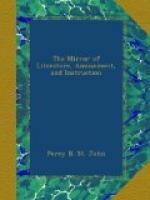Making and Manufacturing.—There exists a considerable difference between the terms making and manufacturing. The former refers to the production of a small, the latter to that of a very large number of individuals; and the difference is well illustrated in the evidence given before the Committee of the House of Commons on the Export of Tools and Machinery. On that occasion Mr. Maudslay stated, that he had been applied to by the Navy Board to make iron tanks for ships, and that he was rather unwilling to do so, as he considered it to be out of his line of business; however, he undertook to make one as a trial. The holes for the rivets were punched by hand-punching with presses, and the 1,680 holes which each tank required cost seven shillings. The Navy Board who required a large number, proposed that he should supply forty tanks a week for many months. The magnitude of the order made it worth while to commence manufacturer, and to make tools for the express business. Mr. Maudslay therefore offered, if the Board would give him an order for two thousand tanks, to supply them at the rate of eighty per week. The order was given: he made the tools, by which the expense of punching the rivet-holes of each tank was reduced from seven shillings to ninepence; he supplied ninety-eight tanks a week for six months, and the price charged for each was reduced from seventeen pounds to fifteen.
Brass-plate Coal Merchants.—In the recent examination by the committee of the House of Commons into the state of the Coal Trade, it appears that five-sixths of the London public is supplied by a class of middle-men who are called in the trade “Brass-plate Coal Merchants:” these consist principally of merchants’ clerks, gentlemen’s servants, and others, who have no wharfs, but merely give their orders to some true coal-merchant, who sends in the coals from his wharf. The brass-plate coal merchant, of course, receives a commission for his agency, which is just so much loss to the consumer.
Raw Materials.—Gold-leaf consists of a portion of the metal beaten out to so great a degree of thinness, as to allow a greenish-blue light to be transmitted through its pores. About 400 square inches of this are sold, in the form of a small book, containing twenty-five leaves of gold for 1_s_. 6_d_. In this case, the raw material, or gold, is worth rather less than two-thirds of the manufactured article. In the case of silver leaf, the labour considerably exceeds the value of the material. A book of fifty leaves, covering above 1,000 square inches is sold for 1_s_. 3_d_.
The quantity of labour applied to Venetian gold chains is very great, but incomparably less than that which is applied to some of the manufactures of iron. In the case of the smallest Venetian chain the value of the labour is not above thirty times that of the gold. The pendulum spring of a watch, which governs the vibrations of the balance, costs at the retail price twopence, and weighs fifteen one-hundredths of a grain, whilst the retail price of a pound of the best iron, the raw material out of which fifty thousand such springs are made, is exactly the sum of twopence.




